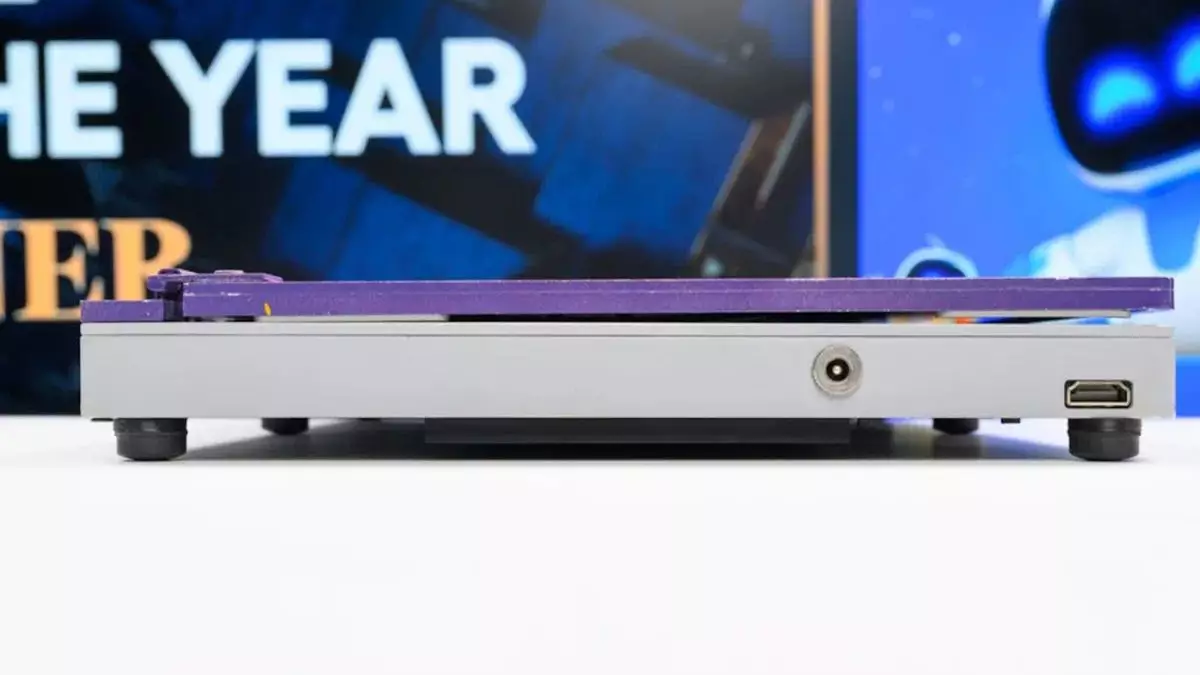In the fast-evolving world of gaming technology, portability remains a key focus. With gaming handhelds capturing the market’s imagination, one might expect gaming laptops to follow suit, becoming lighter and more versatile. However, the BBook AI Original Edition, a mod inspired by the PlayStation 5, presents a notable exception to this trend—it’s almost a parody of what a portable gaming machine should be. As a gaming laptop enthusiast, the BBook AI caught my attention, not for its sleekness or cutting-edge specs, but for its sheer mass and impractical design choices.
This 3D printed behemoth boasts a thickness of over 31 mm and weighs a staggering 9.5 pounds (approximately 4.3 kg), positioning it as one of the heftiest gaming laptops to date. It challenges the existing norms of portable gaming devices, standing out in stark contrast to the slim and lightweight models that have become the gold standard. Stripped of conventional portability, one wonders who the target audience for this gaming luddite might be, or if it is simply a creative ploy designed to grab attention.
This modder’s dream, crafted with a full-sized keyboard and a sizable 17-inch 4K IPS panel, retains some attractive elements. Yet, it frustratingly locks the screen to a mere 60 Hz refresh rate, which barely scratches the surface of what modern gaming laptops provide in terms of refresh rate and responsiveness. One can’t help but feel that, had the designer opted for a higher refresh rate, even a limited battery life would have been acceptable. But alas, the absence of a battery altogether casts a shadow over its legitimacy as a gaming laptop, rendering it more of a stationary console—further diminishing its value in a marketplace increasingly emphasizing mobility.
While it mirrors the standard PlayStation 5 in terms of hardware, many gamers will likely be left pondering the wisdom of creating a portable device without the ability to actually be portable. The absence of a battery isn’t merely an omission; it fundamentally alters the functionality of the device and compromises the user experience. In an age where gaming can occur virtually anywhere, the BBook AI may find itself categorized as a novelty item rather than a serious contender.
Performance-wise, the BBook AI doesn’t shy away from drawing attention—albeit for reasons that might leave gamers disappointed. During gaming sessions, it generates a cacophony with sound levels peaking at 71.3 decibels; this noise level is akin to a high-powered hairdryer. Not only does this undermine the immersive gaming experience, but it also poses social challenges for gamers looking to enjoy their hobby in quieter settings, particularly when sharing living spaces with others. Imagine trying to enjoy a late-night raid in your favorite MMORPG, only to drown out an entire household with your clunky gaming rig.
Despite these drawbacks, the allure of the BBook AI Original Edition comes down to its pricing. With a suggested retail price around $2,748, one must ask whether it delivers value proportionate to its cost. While custom builds often come with a premium, the BBook AI’s performance doesn’t exactly justify such an expenditure, especially in light of other options on the market that offer a complete package—power, portability, and practicality.
To wrap up, the BBook AI Original Edition stands as an eccentric entry in the landscape of gaming machines. It appeals to those with an appreciation for unique craftsmanship or who possess a strong sense of nostalgia. However, it falters in its execution, ultimately failing to fulfill its basic role as a portable gaming device. As gaming enthusiasts continue to seek devices that are not only powerful but also convenient to use, the BBook AI may serve better as a conversation starter than a practical gaming solution. The journey of innovation in gaming devices is one of constant exploration, but the BBook AI raises questions about the balance between creativity and usability—a delicate line that many future designs will need to navigate carefully.


Leave a Reply